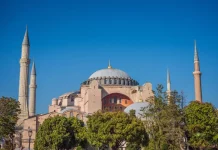The global demand for halal products is predicted to rise in parallel with the growth of the worldwide Muslim ummah. It is estimated that the population of Muslims were around 1.9 billion in 2022, accounting for approximately 24% of the global population and with a spending of USD2 trillion (food, pharmaceuticals, cosmetics, modest fashion, travel, and media, etc.) in 2021 (see, “State of the global Islamic report”, DinarStandard, 2022).
The term halal is derived from the Arabic term – denoting that which is “authorised”, “lawful” or “permitted”/ “allowable” by the Shariah code or the comprehensive system and set of Islamic laws as the all-encompassing rule and canon of the Muslim way of life. For example, it is inclusive of the method used to slaughter animals such as the ritual procedures which also goes towards fulfilment of sanitary/hygienic considerations and the meeting of certain required standards – fit for Muslim consumption.
The halal industry in Malaysia has played a prominent role in supporting and bolstering the country’s economic growth – complementing, supplementing and driving the major planks of our exports across a range of sectors from food & beverages (F&B) to pharmaceutical, cosmetic and personal care products as well as palm oil derivatives alongside industrial chemicals, among others, as top product categories.
Our top halal export destinations include China, Singapore, the US, Japan and Indonesia (“Mohd Shahar: Malaysia needs collaborative efforts to support halal industry”, The Malaysian Reserve, October 3, 2022).
By 2030, the domestic halal industry is projected to achieve USD113.2 billion as reported in the Malaysia Halal Industry Plan 2030 (HIMP 2030). Not only that, as outlined in the 12th Malaysia Plan, this high impact industry is predicted to improve its GDP contribution to 8.1% by 2025.
The establishment of halal industrial parks by the Halal Development Corporation (HDC) has played a notable role in the development of the halal economy of Malaysia – positioning us to be the world’s largest halal hub.
The country’s halal industrial parks comprise 14 strategic halal parks (among others) and cover a total area of 80,937.13ha. There are 295 companies operating, including 42 multinational companies (MNCs).
Through the halal industrial parks’ initiative, Malaysia has by far garnered more than RM16 billion worth of investments, with RM9.5 billion or 59% coming from foreign direct investment/FDI (see, “Halal Malaysia Industrial Parks has attracted RM16 bln investments so far – Tengku Zafrul, AstroAwani, September 16, 2022).
However, only 20% out of 8,000 halal-certified enterprises are involving in (shouldering the burden of the halal industry’s) exports (see, “Halal Malaysia Industrial Parks attracts more than RM16b investment, Malaysian Reserve, September 8, 2022).
Halal products and services are in high demand and covering a variety of industries, including F&B, cosmetics and personal care, textiles, pharmaceuticals, finance, e-commerce, hospitality, and tourism.
Non-Muslims including in countries where they constitute the majority such as neighbouring Singapore, for instance, are now becoming more aware and accepting of what was hitherto deemed to be an exclusively theological concept and steadily recognising the profound benefits of practicing halal as part of a holistic lifestyle. Such a trend is due to increased wellness and moral consciousness together with a growing sensitivity to socially (and environmentally) responsible business/commercial activities and investments – which are in broad conformity with Islamic and halal values.
And we have not only pioneered the development and growth of Islamic finance and banking. But have also one of the highest halal standards in the world that is regulated – ultimately and originally accredited and certified – by JAKIM with the HDC as “the central coordinator that promotes participation and facilitates growth of industry players in the development of Malaysia’s halal ecosystem”.
Even though Malaysia is widely renowned as a major global halal hub, there are several challenges faced by the industry such as insufficient technical expertise in certification, the lack of cost-effectiveness in compliance measures, misunderstanding of halal principles, and intensifying competition from nations with developing halal industries (see, “Issues and challenges of halal implementation in food industry in Malaysia”, International Journal of Business and Management Study, Yusuf et al., 2015).
Increased worldwide competitiveness will be one of the new potential issues Malaysia will confront in the halal business.
Although Muslim majority countries like Malaysia, Indonesia and Brunei have been dominating the halal industry, non-Muslim majority countries like South Korea, New Zealand, Japan and the US have now recognised the prospects of the global halal industry – leading to a more competitive market (see “Global Halal Industry: Realities and Opportunities”, International Journal of Islamic Ethics, Siddique et al., Vol. 5 No. 1, 2020).
At the same time, growing awareness of the halal industry opens up new opportunities for Malaysia to tap into.
For instance, as part of the initiative to promote halal tourism in South Korea, the Korean Institute of Halal Industry (KIHI) entered into a strategic collaboration with HDC to provide Muslim-friendly services and products covering the travel and hospitality segments of airlines, hotels, restaurants, etc. so that Seoul can be well-poised to be a Muslim/halal-friendly city (see “Malaysia turns to soft power to open up Korean halal, Muslim-friendly market, SalaamGateway, July 2021).
Similar efforts can be undertaken by HDC with counterparts in other countries (e.g., China) and regions (e.g., North America and Australasia).
To up the ante for our halal industry and economy, we should not only be forging and fostering strategic partnerships overseas but also seek to strengthen and bolster our domestic resilience – to further boost our exports amid mounting competitive pressures – thus turning what could be a headwind into a tailwind.
Following are the policy recommendations proposed by EMIR Research to the relevant stakeholders – part of the effort to push forward the support for our halal industry and economy – focussing on digitalisation and the Fourth Industrial Revolution (4IR) as the catalyst drivers and impetus for further growth and development:
- Promoting halal gastro-diplomacy through digitalisation
Gastrodiplomacy or culinary diplomacy is the use of food as a soft power (i.e., diplomatic tool) that conveys a country’s cultural heritage or national brand (see “Gastrodiplomacy as a Soft Power Tool to Enhance Nation Brand, Journal of Media and Information Warfare, Fatin Mahirah, Vol. 7, 2015). As such, the halal economy of Malaysia can be leveraged in this respect.
The Malaysia International Halal Showcase (MIHAS), run by the Malaysia External Trade Development Corporation (MATRADE), is a living embodiment.
Due to Covid-19, MIHAS 2021 was done digitally. Surprisingly, it was noted that that year’s trade performance (RM 1.2 trillion) was the highest in comparison to prior years (see, “MIHAS 2022 Poised to Spur Global Halal Economy, MIHAS, June 17, 2022). Through digitalisation, more businesses can be connected and networked – which also facilitates technical exchanges, etc. which in turn spurs the performance of the halal industry.
In addition, the Halal Integrated Platform (HDI) by HDC should be integrated with similar digital platforms in other countries.
An example is (again) South Korea. The country offers a variety of Muslim-friendly apps such as Mufko, which offer details on retail, restaurants and other services. The HDI can be integrated with Mufko to promote business opportunities for our halal industry to penetrate the South Korean market, e.g., frozen or processed foods and snacks.
- Implementing 4IR in the manufacturing and production processes
The integration of the Hazard Analysis Critical Control Point (HACCP) which puts into practice the procedure and process of monitoring, detecting/identifying, tracking and tracing and evaluating/assessing, and implementing corrective or remedial action in respect of significant hazards to food safety with halal certification can be enhanced with 4IR – e.g., deploying sensor technologies and real-time data analytics to monitor incoming raw materials such as ingredients and subsequently track and trace for any breach of the parameters.
For example, according to technologist Mohd Iskandar Illyas Tan, Industrial Internet of Things (IIoT). IIoT is an extension to IoT which can help revolutionise halal industry by enabling the acquisition and accessibility of Big Data. IIoT can digitalise the entire of halal supply chain – from farms to warehousing and to food distribution and retailing, enables halal producers and regulators to leverage technologies that monitor and analyse the entirety of the process.
IIoT has the potential to address various halal industry challenges, including product quality, timeliness of delivery, waste, spoilage, and recalls.
Through digital adoption and automation, our small and medium-sized enterprises (SMEs) can be equipped to tap into the global halal market.
In 2021, SMEs generated around 13.5% of the RM36.3 billion in halal exports in 2021, whereas multinational companies represented the remaining 86.5%. Therefore, the potential for increasing the share of exports can be boosted and promoted with the implementation of 4IR.
- Promoting the critical implementation of blockchain technology
Blockchain technology is imperative to ensure F&B businesses comply with the halal standards.
A halal blockchain would be a digital record of every transaction ever made in the halal supply chain from producing to distributing and purchasing, where the information or legitimacy of the product is verified and validated by scanning the barcode on the halal product (see “Leveraging Blockchain Technology for Halal Supply Chains”, ICR Journal, Tieman, et.al, 8(4), 547-550, 2017).
Blockchain technology is the ultimate solution to prevent fraudulent claims in halal certifications such as in relation to meats and other food items.
In recent years consumers have been relying on e-commerce platforms to purchase goods and services. According to news reports, some non-Muslim online vendors have allegedly been selling products that JAKIM has not authorised (see, “Poses Over Halal Status of Products Sold on E-commerce Sites, Bernama, December 22, 2022).
It cannot be emphasised strongly enough that a universal, systematic blockchain technology can effectively address issues involving halal certification process, by means of establishing a centralised system – that involves any direct or indirect product distribution in the market.
As such, this eventually enhances the quality assurance (QA) of the Malaysian halal standards.
This is because blockchain technology enables and allows for transparency and immutability in the entire halal supply chain system.
Last but not least, blockchain technology can promote the diversification of the supply chains. This is because e.g., the halal certification is tamper-proof based on cryptography (secure communications), consumers will be enabled and empowered to check the status of a product.
We need to move beyond (mere) compliance to halal requirements and standards and towards elevating and upgrading our branding and prestige via the digitalisation of our halal industry and economy.
By Jason Loh & Jachintha Joyce









